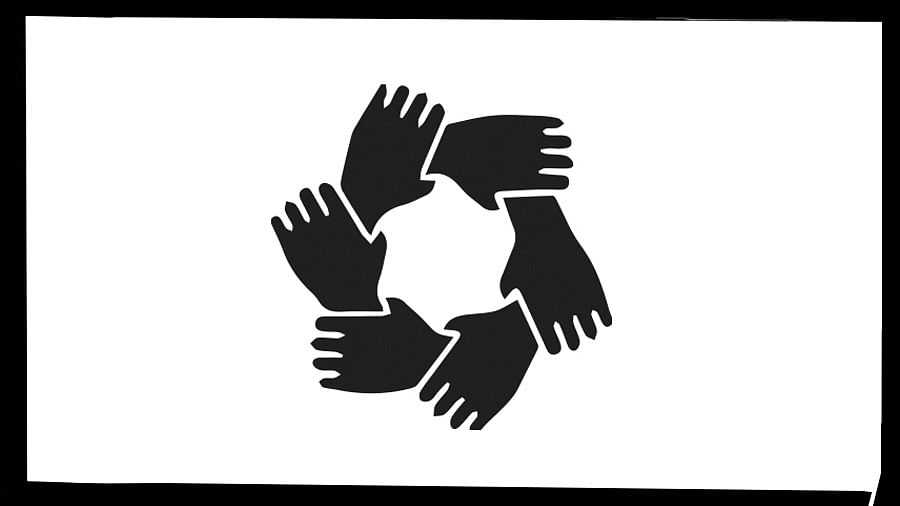
Credit: DH Illustration
With the coming together of 26 parties to announce the formation of the Indian National Development Inclusive Alliance (I.N.D.I.A.), it is evident that the battle of the 2024 general elections for the ruling right-wing establishment will not be easy. While major national and regional parties in the opposition have joined this alliance and appealed to other secular parties to unite for a decisive defeat of the Bharatiya Janata Party (BJP), some parties have decided to operate at the fences. Notably, the absence of the Bahujan Samaj Party (BSP) in this alliance has raised eyebrows, as it has a history of a remarkable struggle against Brahmanical hegemony and is seen as the vanguard of social justice politics.
It has been acknowledged that defeating right-wing forces can only be achieved by mobilising the majority of the population, especially the Dalits, Adivasis, and Other Backward Castes (OBCs), on the alternative agenda of social justice. In this context, it becomes necessary to ask why Dalit political parties and leaders have not come together to organise a political bloc to reignite the national-level social justice movement. Further, it is also difficult to understand the distancing of parties like the BSP and Prakash Ambedkar’s Vanchit Bahujan Aghadi (VBA) from secular political fronts like I.N.D.I.A., especially when their independent political strength alone may not be enough to counter the right-wing assertion.
The primary mission of Dalit politics is to carry forward the legacy of Babasaheb Ambedkar’s political struggles and establish the Dalit-Bahujan mass as the key transformative force in democratic institutions. Dalit parties were at the forefront in contesting the cases of social injustices, caste atrocities, and violence against marginalised social groups. The BSP, in particular, announced that it will form a greater social alliance with other oppressed and marginalised communities, especially the Adivasis, religious minorities, poor working classes, and landless agrarian labourers, and strengthen the Bahujan movement against the communal-brahmanical-patriarchal order.
In the mid-1990s, the nation witnessed the arrival of powerful Dalit leadership and movements in major states. The BSP under the leadership of Kanshi Ram and Mayawati in Uttar Pradesh, the impressive Republican-Bahujan leaders like Prakash Ambedkar and Ramdas Athawale in Maharashtra, the Viduthalai Chiruthaigal Katchi (VCK) under Thirumavalavan in Tamil Nadu, and the Janata Dal faction led by Ram Vilas Paswan in Bihar had provided a dignified and robust voice to Dalit subjectivity and made them an essential component of democratic processes. Though there was no alliance between various Dalit political outfits, they had an ideological comradery around the values of social justice, secularism, and socialism.
At the beginning, the Dalit parties showed deep intimacy with secular ideals. However, the maverick rise of the BJP at the national scene brought defining ruptures within the Dalit political movement. The BSP was the first to join hands with the BJP in 1995 to form the first state government headed by Mayawati in UP. It was followed by many socialist leaders, including Ram Vilas Paswan, to join the BJP-led alliance and secure an important portfolio in Atal Bihari Vajpayee’s Cabinet in 1999. In Maharashtra, Ramdas Athawale’s Republican Party of India distanced itself from the radical ideas of the Dalit movement and formed an electoral alliance with the BJP in 2014.
Periodically, only a few Dalit political leaders advanced the revolutionary task of social justice politics. Among the Dalit parties, it is the VCK and political outfits led by Prakash Ambedkar (the VBA) that have retained a consistent anti-BJP position and formed alliances only with the secular parties.
It is a visible fact that sections among the Dalits are growingly attracted to the BJP’s communal politics, divorcing the rich ideals of the Ambedkarite social movement. The BJP’s social engineering is calculative, and its cultural strategies are effective in mobilising the Dalit-Bahujan sections, especially in states like Uttar Pradesh, Madhya Pradesh, and Haryana. Ironically, the Dalit parties lack strategic interventions to halt the right-wing’s growing influence over the socially deprived communities. It also appears that the Dalit intellectual class, social leaders, and civil society activists also operate under fear or depression, as even on these fronts, there are few interventions that can motivate and mobilise the socially marginalised groups.
The divisions between the Dalit political parties showcase that there is no consensus on ideological parameters. The leadership further lacks vision and political initiatives that can elevate the prospect of the Dalit movement and mobilise the socially marginalised communities for impressive success in electoral battles. Though other political parties have often joined hands to secure their class and social interests, the Dalit parties have hardly pondered the possibility of uniting different Dalit political and social organisations. These parties often remain attached to their regional specificities and lack the political imagination that can unify the social justice parties to announce a robust national Dalit agenda. The other marginalised communities, like the Adivasis and the Muslims, also hesitate to open a sincere dialogue with the Dalit political outfits, as their political commitment and ideological merit often remain under doubt.
In the recent past, politics based on the ideals of social justice have continuously been marginalised and remained passive. A unified political bloc of social justice parties, especially the BSP, VCK, and VBA, can reenergise the dormant Dalit movement and mobilise the oppressed communities for substantive political change. It is necessary for such a bloc to associate with other secular alliances for a decisive battle against the right-wing force. It is equally important for the leaders of I.N.D.I.A. to provide dignified political space to the Dalit leaders and herald social justice as the primary agenda in its manifesto. A unified front to defend the ideals of secularism and social justice will be a crucial challenge and can halt the right-wing juggernaut.
(The writer teaches at the Centre for Political Studies, JNU)